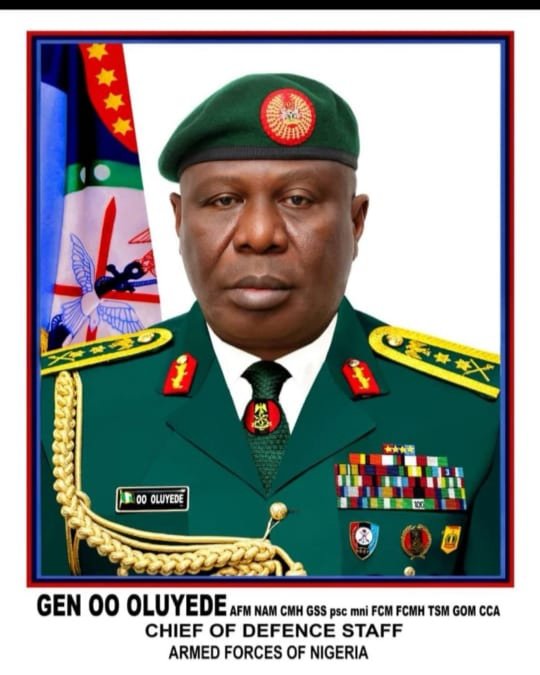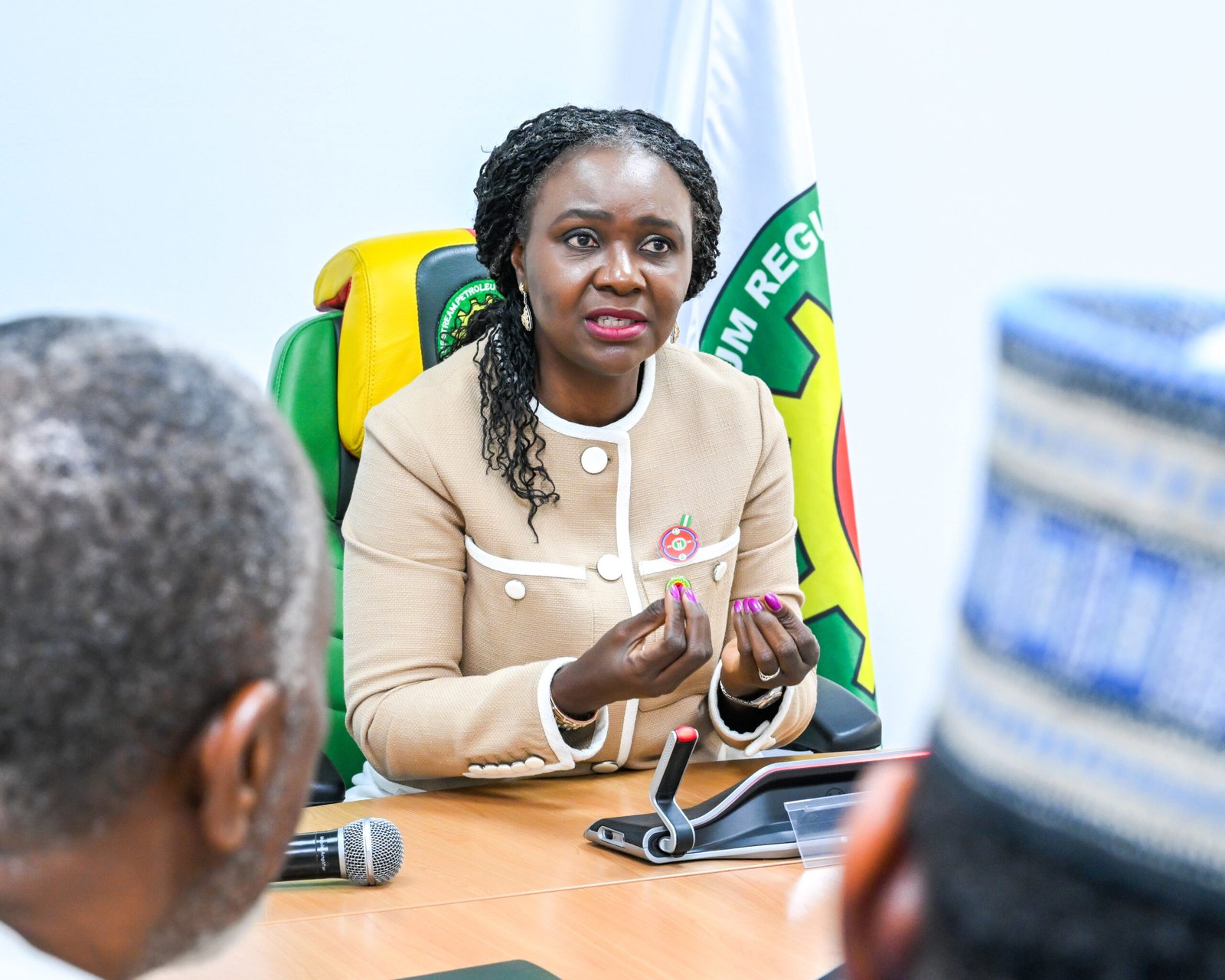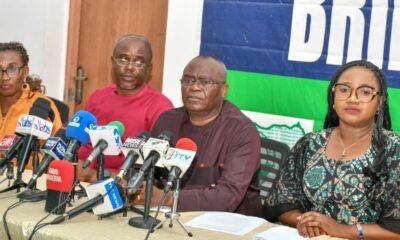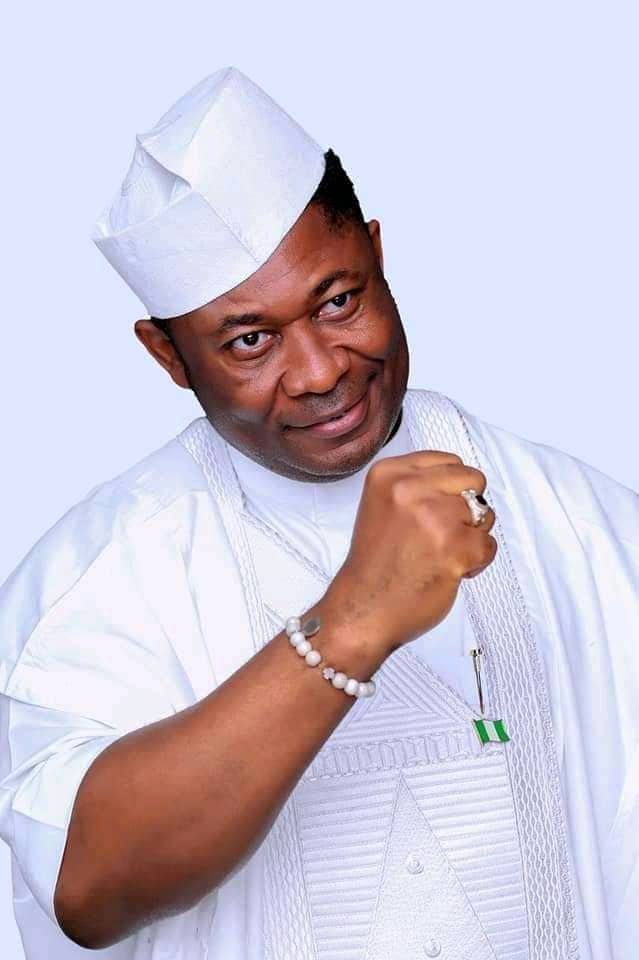Opinion
BUILDING A GREATER NAVY AND OGALLA’S FOOTPRINTS

By Tolulope Adebayo
Vice Admiral Emmanuel Ikechukwu Ogalla is the Chief of Naval Staff, he was appointed to the position by President Tinubu in June 2023. A seasoned navigator, he is expected to lead the Nigerian Navy in manning Nigeria’s vast maritime frontier which stretches a formidable 84,000 nautical miles, with over 3,000 lakes and rivers, the former equating with a third of Nigerians landmass.
This herculean task demands a leader that is determined, disciplined, with a wealth of experience and exceptionally focused vision, to harness the potentials in both the Maritime Sector and develop the nation’s Blue Economy, who also appreciates the imperatives of building the capacity of the Nigerian Navy to secure its maritime environment, as well as extend it to the Gulf of Guinea
CNS Ogalla may not command all the salient qualities demanding of his formidable and highly demanding office. No one, even him nor President Bola Ahmed Tinubu who appointed him, genuinely expected that he possess such conspicuous qualities.
Ikechukwu simply came in unexpectedly, simply put the current CNS came on board as a dark horse. His emergence was greeted with mixed reactions. Not many believe in his capacity, and his capability to deliver just as the C-in-C knew. But today he has proven many wrong.
Ogalla has shown that, one’s ethnicity is not what is required to deliver on a job like this. He has proved that contrary to misconceptions about him, he is a man prepared for the job.
Under the leadership of CNS Ogalla, the Nigerian Navy maritime security made significant improvements in legitimate shipping activities due to reduction of crimes in Nigerian waters, leading to appreciable rise in oil production and progressive decline in oil theft and illegal oil bunkering activities.
Ogalla through the annual sea inspection exercise has made giant strides in positively impacting on the readiness for combat operations of the naval personnel, which also has exposed other maritime agencies to the benefits of interagency cooperation. This has led to positive rise in oil production as several companies have reported 100 per cent terminal factor.
The sustained presence of Nigerian Navy ships at sea, deployment of technology for surveillance, improved inter agency collaboration and international partnerships as facilitated by exercises such as DEIN ABAJI which translates to ‘Calm Waters’ in Kalabari dialect, has led to unprecedented breakthroughs as well as curb maritime threats in line with the statutory roles of the Nigerian Navy which include protecting the maritime environment for national economic prosperity, and supporting existing domestic and regional maritime security initiatives.
Ogalla utilized his comprehensive strategy; the Total Spectrum Maritime Strategy (TSMS), and his vast knowledge of the maritime domain and tactical operations to tackle maritime crimes and promote economic growth. This holistic agenda which includes the designation of Special Courts for Maritime Crimes, Advocacy Campaigns to enlist community support, and Socioeconomic Crime Prevention Strategies, also focuses on enhancing naval capabilities through fleet renewal, operational readiness, and infrastructural development, and the prioritization of human capital development through personnel welfare and motivation, manpower training, and youth and sports development has greatly impacted on the Nigerian Navy.
Part of his strategy of is to effectively implement a robust maritime stakeholders’ engagement and interagency cooperation. By implementing these measures, the CNS aims to safeguard Nigeria’s maritime interests, promote economic growth, and enhance regional stability. Through this robust confidence-building, partnership and interagency relationship dialogue, he initiates the various security outcomes within Nigeria’s maritime domain and the littorals, including land-based engagements in fulfilment of national interest. The synergy has led to intelligence sharing amongst various agencies such as NIMASA, NPA, NDLEA, NOSDRA, and NEMA, as well as many foreign bilateral meetings and talks with the American Chief of Naval Service, Operation (CNO), and also enhanced trust, confidence building, synergy and operational successes.
A strong believer in a highly motivated professional naval force, CNS Emmanuel Ogalla, set in various measures and alternatives aimed at maintaining and equipping a professionally competent and ethical naval force, which will leverage on all the elements of national powers to effectively defend Nigeria’s maritime area against all forms of threat and deliver the imperatives of national security.
In order to give action to his words, the CNS carried out various practical reforms and projects aimed at recapitalizing the Naval ship, one of such is the re-equipping of the Naval Shipyard Limited to construct and fabricate small boats, big vessels and other facilities of the Navy, has eliminated capital flight and encouraged the training and development of skilled manpower not just within the Navy but as a means to entrepreneurial development and self-employment.
This move has in no small measure reduced capital flight and enhanced, as well as encouraged the training and development of skilled manpower.
As part of his commitment and dedication to the welfare of his personnel, Vice Admiral Ogalla conducts frequent inspection and supervisory tours of the various Naval ships aimed at fostering closer ties, as well as establishing the welfare of the personnel. Those visits served as a morale booster and helped to motivate the personnel, as it equally becomes an avenue for having firsthand knowledge of the conditions of the personnel. The visit has been adjudged to greatly increase the morale of the officers and men, as well as a forum for a one-on-one with the CNS.
For instance, in one fell swoop operation, within three months, the Nigerian Navy recorded a debilitating breakthrough against the criminals, leading to the seizure of 95 wooden boats, 119 de-activated storage tanks refining ovens, 447 deactivated dugout pits, 120 deactivated Illegal Refining Sites, 13 seized fibre boats, 9 seized vehicles, 74 arrested suspects, and 14 arrested vessels including MT KALI, MT HARBOUR SPIRIT, MT SAISNIL, MV TOKITO, MT VINILLARIS and MT SWEET MIRI, among others.
Some of the arrested vessels include MT KALI, MT HABOUR SPIRIT, MT SAISNIL, MV TOKITO, MT VINILLARIS, and MT SWEET MIRI.
The Nigeria Navy under his watch, has shown avowed commitment to the ideals of the Tinubu Presidency, by supporting land operations in all the geopolitical zones of the country, winning the war against evil and ensuring a crime-free Nigeria through the strategy of Maritime Domain Awareness Capacity, he strategy has also compelled naval personnel to civility, and activated deterrent measures to curb negligence and unprofessional conduct of personnel but also provided all year-round situation awareness of Nigeria’s maritime domain extending to the limits of the Exclusive Economic Zone.
With the capitalization of 2 XSeaward Defense Boats (SDB); constructed locally, the various Platforms, thereby ensuring and supporting its anti-piracy, anti-CoT, anti-IUU and anti-illegal drugs, combined with the acquisition of 2nd Offshore Survey Vessels, 2 by 32m FPBs and helicopters (NNS CHALAWA, P196-Seaward Defense Boat, NNS ZUR P195 – Seaward Defense Boat and NNS OCHUZOR Survey Vessels and the delivery of 2 by 76m OPVs from Turkey, the Nigeria Navy remains the most dominant in the Gulf of Guinea (GoG) and the 4th largest in Africa.
Presently, under Vice Admiral Ogalla, the Nigerian Navy has over 50 capital ships and several hundreds of boats to cover the maritime space and internal waters. While the capital ships are used to patrol the sea, the small vessels carry out routine patrols also.
His non-kinetic approach has brokered several peace initiatives amongst communities and deepened community-military harmony within Nigeria’s Oil/Gas littoral area.
Not leaving out the welfare of the personnel, Vice Admiral Emmanuel Ogalla, has also demonstrated leadership and empathy by ensuring the construction of 50 units of 3 bedrooms, 128 units of 2 bedrooms and 120 units of 2 bedrooms apartments in Galadimawa, Asokoro Abuja, Lagos, Calabar and Port-Harcourt.
With an eye on sustainability, intellectual development and research, the Chief of Naval Staff on the 1st of June, 2024 launched the International Maritime Institute (IMION), an institution which will serve as a confluence for maritime discourse, the scintillation of ideas, and a vehicle for the articulation of maritime strategy on the African Continent.
With the launch of this crowning glory, the CNS intends to decimate, with a single shot, an institution which will also serve as a think-tank for maritime strategic thinkers, practitioners and allies with a far-reaching benefit of enhancing effective interaction, idea sharing and research into maritime strategic affairs affecting not only the Gulf of Guinea but the rest of the world, in such thematic areas as, maritime and ocean governance, maritime security, law enforcement, hydrography, blue economy, and climate change amongst others.
Under Ogalla’s visionary leadership, Nigeria’s war against oil theft has witnessed unprecedented success. His bold strategies, collaborative approach, and commitment to personnel welfare have transformed the Nigerian Navy into a formidable force. The Total Spectrum Maritime Strategy has yielded remarkable results, significantly boosting national security and contributing to global maritime stability. Ogalla’s efforts have solidified his legacy as a champion of maritime security and economic growth, earning the confidence of Nigerians and international partners alike.
It is instructive to note that the FALCON eye system of the Nigerian Navy is a state-of-the-art surveillance facility that incorporates various sensors located along the nation’s enormous coastline, such as Radars, long-range Electro Optic Systems with thermal or night vision capability, Automatic Identification System receivers, Weather Stations and marine Very High-Frequency Radios for communication.
The device consists of over-the-horizon radars with a range of 200 miles, long-range electro-optical systems with a range of 30 miles, and automatic identification system (AIS) receivers. These are linked to three regional control centres and a network operations centre to provide real-time situational awareness of the country’s waters.
The integration of these technologies has led to the generation of real-time situational awareness of the activities of vessels in the Nigerian maritime domain and some selected parts in the Gulf of Guinea.
Presently, the deployment of technology has assisted in attaining real-time aerial surveillance. Drones equipped with high-resolution cameras and sensors can provide continuous aerial surveillance of pipelines, oil facilities, and surrounding areas, capturing real-time data and visual feeds. Drones can capture detailed images and videos, allowing for the identification of unauthorized activities, potential threats, and illegal taps on pipelines, all of these enhance rapid response.
In the area of criminal detection, prevention and deterrence, with detection being the key reason for the deployment of the technology, early detection and deterrence can be easily and promptly achieved. Early detection, advanced sensors and AI algorithms are now effectively and efficiently used to detect anomalies such as leaks, illegal taps, and unauthorized movements along pipelines thereby preventing wastages and the dangers of scooping and its potential risk.
Thermal imaging by drones equipped with thermal cameras is also used to identify heat signatures from illegal activities or equipment tampering, even in low visibility conditions such as nighttime or dense vegetation, this has become a potent tool for deterrence, while the physical visible presence of drones also acts as a deterrent to potential thieves, reducing the likelihood of thefts. While in flight, drones programmed to send automated alerts can automatically alert security personnel and local authorities upon detecting suspicious activities, enabling rapid intervention.
The deployment of innovative mandatory of the technology has led to an unprecedented high level of safety for all personnel and minimization of access to hazardous areas, thereby reducing the risk of injury or exposure to toxic substances and dangerous situations including armed attacks by oil thieves.
Instead Naval personnel can now monitor and respond to incidents from a safe distance, enhancing overall safety and minimizing direct human involvement.
All these leads also to overall cost efficiency, the strengthening of the operational capacity of the Navy and the enhancement of its capability to keep personnel abreast of global trends relating to evolving technological advancements in the maritime industry, as well as maintain a competitive edge during operations.
Aside, the use of AI has greatly improved the Nigerian Navy’s decision-making processes, such as predicting the most fuel-efficient way to operate a vessel and has also affected the ship’s navigation system, radar operations or threat-detection systems to help operators’ process information faster, effectively respond to a range of maritime threats such as illegal, unreported and unregulated fishing (IUU); drug smuggling; and piracy, eliminating the loss in revenue suffered annually by Nigeria of about $70 million to IUU fishing perpetrated by a host of foreign fleets, mostly Chinese.
Part of the achievements of the automatic mode is that the CMS can detect a target and identify, classify and prioritize targets before deploying weapons, although people are involved in decisions about when and how to use weapons.
As part of another landmark breakthrough, the CNS has established an overarching control facility at Naval Headquarters in Abuja. The Command-and-Control Centre is filled with television screens on one wall, directly faced by at least a dozen individual workstations for monitoring the sensors.
The Command-and-Control Centre is to enable the Nigerian Navy generate a comprehensive intelligence picture of activities within the maritime environment. This can thereafter be analyzed in appropriate cases, dispatching a Nigerian Navy ship for interdiction, investigation, and/or subsequent arrest of erring vessels.
The various operations with clear mandate to tackle Crude Oil Theft (COT), Illegal oil bunkering, pipeline vandalism and a host of other criminalities on the nation’s maritime area have significantly disrupted oil thieves and vandals, leading to the recovery of substantial amounts of stolen products and the dismantling of illegal refining sites, with the recovery of massive quantities of stolen products, the dismantling of Illegal Refining Sites, arrest of suspects, and seizure of stolen products, are clearly eloquent testimonies of a determined result-oriented leader.
Today, the Nigerian Navy is at its highest state of operational readiness and ranks as the 4th largest Navy in Africa. Vice Admiral Emmanuel Ikechukwu Ogalla’s footprints are clearly on the rock of time, as a clear case of not judging a book by its cover.
Adebayo is a maritime communication expert based in Abuja.
Opinion
No More Pipeline Vandalism in The Niger Delta, But…

APPRAISING MILITARY RESOLVE AND THE PATH TO SUSTAINABLE OIL SECURITY
By Aaron Mike Odeh
On a recent media assessment visit by the Director, Defence Media Operations, Major General Michael E Onoja on the 20 January 2026, the General Officer Commanding (GOC), 6 Division of the Nigerian Army and Commander Land Component Operation DELTA SAFE, Major General Emmanuel Emeka, stated that there will be “no more pipeline vandalism in the Niger Delta” indicating a strong affirmation of military resolve and institutional confidence in the ongoing operations within Nigeria’s most economically strategic region.
Far from being a casual statement, the pronouncement reflects the operational posture, command clarity, and renewed determination of the Nigerian Armed Forces (AFN) under the leadership of General Olufemi Oluyede. It signals a clear message: the era of unchecked sabotage of national economic assets is being decisively confronted.
CONTEXTUALISING THE GOC’S DECLARATION
Statements of this magnitude from a serving GOC carry both symbolic and operational weight. They are rooted in firsthand command experience, intelligence assessments, and measurable gains on the ground. In this regard, Major General Emmanuel Emeka’s assertion should be understood as a projection of confidence derived from sustained military engagement, improved coordination with sister security agencies, and enhanced operational discipline within the 6 Division’s area of responsibility.
The Niger Delta has long posed complex security challenges due to its difficult terrain, extensive pipeline networks, and the activities of organised criminal syndicates. Against this backdrop, the GOC’s declaration underscores a belief that the Nigerian Armed Forces has reached a level of operational advantage sufficient to deter, disrupt, and dismantle pipeline vandalism networks.
OPERATIONAL GAINS AND MILITARY PROFESSIONALISM
Under Major General Emmanuel Emeka’s command, the 6 Division has intensified patrols, improved intelligence-led operations, and sustained pressure on illegal refining camps and crude oil theft routes. These efforts align with the Federal Government’s strategic objective of securing oil infrastructure as a matter of national economic security.
The GOC’s statement therefore reflects not mere optimism, but a professional assessment of the division’s growing capacity to dominate the operational environment. It also reinforces the Nigerian Armed Forces constitutional role as a stabilising force, committed to safeguarding national assets in support of economic recovery and investor confidence.
THE “BUT”: BEYOND KINETIC SUCCESS
While commending the resolve and achievements of the 6 Division, it is equally important to situate the declaration within a broader national framework. The “but” in the statement should not be interpreted as doubt or contradiction; rather, it represents an acknowledgment of the multifaceted nature of pipeline security in the Niger Delta.
Pipeline vandalism has historically been sustained not only by criminal intent, but also by socioeconomic pressures, environmental degradation, and the absence of alternative livelihoods in some host communities. Military success, while indispensable, achieves greater durability when complemented by effective civil governance, economic inclusion, and community trust-building.
COMMUNITY ENGAGEMENT AS A FORCE MULTIPLIER
One of the strengths of recent military operations in the Niger Delta has been improved civil-military relations. The success of the Armed Forces is closely tied to cooperation from local communities, traditional institutions, and credible stakeholders.
Sustainable pipeline security is most effective when host communities become partners in protection rather than passive observers. The GOC’s declaration implicitly places responsibility on all stakeholders—government agencies, oil companies, community leaders, and youths—to consolidate the gains made by the Armed Forces.
INSTITUTIONAL SYNERGY AND NATIONAL RESPONSIBILITY
The efforts of the 6 Division do not exist in isolation. They form part of a wider national security ecosystem involving regulatory agencies, intelligence services, law enforcement bodies, and policy institutions. The GOC’s confidence should therefore inspire complementary actions across these sectors.
Oil companies must uphold environmental standards and transparent community engagement. Regulatory bodies must enforce accountability. Development agencies must deliver visible dividends of peace. These non-military actions reinforce the security umbrella provided by the Nigerian Armed Forces.
LEADERSHIP AND STRATEGIC MESSAGING
Major General Emmanuel Emeka’s statement also serves as strategic communication—boosting troop morale, reassuring investors, and reinforcing public confidence in the Armed Forces of Nigeria. Such leadership messaging is essential in shaping national narratives around security, discipline, and state authority.
By articulating a firm stance against pipeline vandalism, the GOC is not only commanding troops, but shaping expectations and setting benchmarks for operational success.
CONCLUSION
The declaration that there will be “no more pipeline vandalism in the Niger Delta” should be seen as a reflection of strengthened military capacity, improved leadership focus, and renewed institutional confidence under Major General Emmanuel Emeka, GOC 6 Division of the Armed Forces.
The Nigerian Armed Forces has demonstrated readiness to secure critical national assets. The task ahead is to consolidate these gains through sustained operations, inter-agency synergy, and socio-economic interventions that address underlying vulnerabilities.
In this context, the GOC’s statement stands as both an assurance and a call to collective national responsibility—one that deserves commendation, support, and strategic follow-through.
Aaron Mike Odeh, a Public Affairs Analyst Media Consultant and Community Development Advocator wrote from Post Army Housing Estate Kurudu Abuja
Opinion
Appraising NUPRC’s New Tempo

By Grace Ameh
As a woman who has spent years admiring the quiet strength of sisters carving paths in Nigeria’s demanding energy sector, my heart swelled with genuine joy the moment Chief Mrs. Oritsemeyiwa Eyesan’s appointment as Commission Chief Executive of the Nigerian Upstream Petroleum Regulatory Commission was announced.
Here stands a remarkable daughter of the Niger Delta, graceful yet fiercely determined, becoming the first woman to lead our nation’s upstream regulator. Her rise feels deeply personal, like watching a beloved sister finally claim the spotlight she has long deserved.
The NUPRC, as a young agency born from the transformative Petroleum Industry Act of 2021, has shouldered enormous responsibilities in a complex and evolving landscape—navigating fluctuating production levels amid global energy shifts, addressing delays in data dissemination that can affect investor planning, tackling the persistent menace of crude oil theft that impacts national revenue, and working to enhance transparency in licensing rounds and asset management for greater stakeholder confidence.
This institution emerged with bold ambitions to modernise regulation, attract investment, and optimise Nigeria’s hydrocarbon resources, yet it has operated in an environment marked by inherited challenges and the need for continuous adaptation to deliver on its mandate.
Then, in December 2025, President Bola Tinubu nominated Chief Mrs Eyesan as the first woman to lead NUPRC, a move swiftly confirmed by the Senate.
My spirit lifted immediately. Chief Eyesan’s journey inspires every woman dreaming big in this field. She holds a Bachelor of Education in Economics from the prestigious University of Benin, graduating in 1986 with a solid foundation in economic theory, market analysis, and project evaluation—skills that would prove invaluable in the complex world of energy finance and strategy.
Her academic grounding equipped her to navigate large-scale investments and regulatory frameworks with precision. Early in her career, she honed her financial acumen in banking, serving as Branch Manager at People’s Bank of Nigeria and later as Treasury Officer at Gulf Bank, before joining NNPC in 1992.
Over nearly 33 years, she rose steadily through roles in planning, procurement, corporate strategy, and sustainability, culminating as Executive Vice President, Upstream, until her retirement in November 2024. In that position, she oversaw strategic management of Nigeria’s upstream operations, led sustainability initiatives, strengthened financial discipline, and guided critical reforms aligned with the PIA.
Since assuming office, Chief Eyesan has brought a refreshing wave of purpose and collaboration to NUPRC. Her patriotic commitment shines brightly as she aligns the Commission’s work with President Tinubu’s Renewed Hope Agenda, emphasising increased crude oil production to enhance energy security and revenue, accelerated gas monetisation to advance the Decade of Gas vision, and robust transparency measures to rebuild investor trust.
I admire her focus on digitisation; she is thoughtfully integrating digital tools to improve operational efficiency, accountability, and ease of business, cutting through layers of bureaucracy that once slowed progress. Her leadership style feels deeply relatable—inclusive and engaging. With an open-door policy and regular town halls, she encourages staff input while forging stronger ties with stakeholders, labour unions, and professional bodies.
She champions environmentally sustainable practices, ensuring growth does not come at the cost of our land and waters. Her strategic vision unfolds organically: boosting crude reserves and output for economic stability, scaling gas utilisation for power generation and exports, fortifying regulations to attract long-term investments, nurturing technical expertise through partnerships and capacity building, and embedding digitisation hand-in-hand with transparency to foster dynamic, confidence-inspiring growth.
In these early weeks of January 2026, tangible steps are emerging. She has advanced the 2025 licensing round, scheduling a key pre-bid conference for January 14 in Lagos to draw fresh capital into exploration and development. Partnerships, such as deepened synergy with the Nigerian Midstream and Downstream Petroleum Regulatory Authority, highlight her collaborative spirit.
What touches me profoundly is how Chief Eyesan views challenges as opportunities. She inherited an agency needing revitalisation but approaches it with grace, strategy, and unyielding diligence—that workaholic patriotism we so admire in trailblazing women. Her experience positions her uniquely to resolve legacy issues, unlock stranded assets, and position NUPRC as Africa’s premier regulator.
Reflecting on this new era, sisterly pride overwhelms me. Chief Mrs. Oritsemeyiwa Eyesan is truly an Amazon—resilient, visionary, and devoted to Nigeria’s progress. In her capable hands, the upstream sector is not just recovering; it is poised to soar, delivering sustainable wealth for generations.
Dear sister, you embody the hope we renew daily. The light of your leadership illuminates our path forward, proving once again that when a woman of substance rises, the nation rises with her.
*Ameh an Oil and gas expert writes from Kaduna.
Opinion
FIFA World Cup: Counting the costs of Super Eagles missed opportunities

By Victor Okoye
As the football world prepares for the expanded 48-team 2026 FIFA World Cup, Nigeria is facing the prospect of missing the global showpiece for the eighth time since its inception in 1930, a development that has drawn concern from football stakeholders and sports administrators in the country.
The Super Eagles, who made their World Cup debut at USA 1994, have qualified for the finals six times but failed to reach the tournament on seven previous occasions.
Should Nigeria fail to qualify for the 2026 edition, it would mark the eight miss and a second consecutive absence, further highlighting the rising cost of non-participation in an era of unprecedented financial rewards.
Historically, missing the World Cup was largely a sporting setback. Financial incentives were modest in earlier tournaments.
In USA 1994, FIFA’s total prize money stood at about 62 million dollars, with champions Brazil earning roughly four million dollars.
France 1998 offered about 131 million dollars in total prize money, while winners received around six million dollars.
The figures rose steadily to 300 million dollars at Brazil 2014 and 440 million dollars at Russia 2018 and Qatar 2022.
However, FIFA’s recent review has significantly raised the stakes.
The FIFA Council has approved a record 727 million dollars financial package for the 2026 World Cup, to be co-hosted by the United States, Canada and Mexico.
At an estimated exchange rate of 1,500 naira to the dollar, the total sum translates to about 1.09 trillion naira.
Of this amount, 655 million dollars (approximately 982.5 billion naira) will be shared as prize money among the 48 participating teams.
Champions will earn 50 million dollars, runners-up 33 million dollars, third place 29 million dollars and fourth place 27 million dollars.
Teams finishing between fifth and eighth will receive 19 million dollars, ninth to 16th are to receive 15 million dollars, 17th to 32nd will pocket 11 million dollars, while teams ranked 33rd to 48th will earn nine million dollars.
Each qualified nation will also receive 1.5 million dollars as preparation funds.
This guarantees every participating team a minimum of 10.5 million dollars — about 15.75 billion naira — before the tournament begins.
Nigeria’s 2026 qualification campaign ended in disappointment after the Super Eagles finished second behind South Africa in their group and lost the African playoff final to the Democratic Republic of Congo (DR Congo) on penalties.
To date, no public official report has broken down the total operational costs or expenditure to prosecute the 2026 World Cup qualifying campaign (travel, allowances, camps, logistics) but there are concerns and scrutiny over Nigeria Football Federation (NFF) finances.
The scrutiny includes how funds received from FIFA and CAF have been used over the years following the House of Representatives move to probe more than 25 million dollars in FIFA/CAF grants given to the NFF between 2015 and 2025, citing accountability questions.
However, the NFF has petitioned FIFA over alleged player-eligibility breaches by DR Congo, a move that has reopened debate within the football community.
Reacting to the situation, former Super Eagles captain and 1994 AFCON winner, Mutiu Adepoju, described the possibility of another World Cup absence as “a huge setback”.
“Missing one World Cup is painful, but missing two in a row is unacceptable for a country like Nigeria. Beyond pride, the financial loss is enormous and affects football development at all levels,” Adepoju said.
Former NFF Technical Director, Austin Eguavoen, said qualification had become more critical than ever due to the new prize structure.
“In the past, the World Cup was more about exposure. Now, the money involved can change the entire football ecosystem. Missing out means missing an opportunity to invest in grassroots and infrastructure,” Eguavoen said.
Chairman of the Nigeria Premier Football League (NPFL), Gbenga Elegbeleye, said the impact would also be felt in the domestic league.
“When the national team is at the World Cup, it attracts attention to our league and players. Absence reduces visibility, sponsorship interest and confidence in the system,” Elegbeleye said.
Similarly, former Minister of Sports, Solomon Dalung, said Nigeria must treat World Cup qualification as a national project.
“The Super Eagles missing the World Cup repeatedly shows deeper administrative and structural issues. The financial consequences alone should force stakeholders to rethink planning and accountability,” Dalung said.
On the legal challenge before FIFA, NFF Secretary-General, Dr Mohammed Sanusi, confirmed that the matter was under review.
“We have submitted our petition and we are waiting for FIFA’s decision. The rules are clear on nationality and eligibility, and we believe the issues raised deserve careful consideration,” Sanusi said.
If FIFA rules in Nigeria’s favour, the Super Eagles could be reinstated into the intercontinental playoffs, restoring a pathway to qualification and access to guaranteed earnings of at least 15.75 billion naira.
Failure would confirm Nigeria’s eighth World Cup absence, with consequences ranging from lost revenue and reduced global visibility to diminished influence in international football.
With the 2026 World Cup set to deliver the highest financial rewards in FIFA history, stakeholders agree that Nigeria can no longer afford repeated absences from football’s biggest stage.
-

 Cover5 months ago
Cover5 months agoNRC to reposition train services nationwide.. Kayode Opeifa
-

 Fashion9 years ago
Fashion9 years agoThese ’90s fashion trends are making a comeback in 2017
-

 Entertainment9 years ago
Entertainment9 years agoThe final 6 ‘Game of Thrones’ episodes might feel like a full season
-

 Opinion1 year ago
Opinion1 year agoBureaucratic Soldier, Kana Ibrahim heads Ministry of Aviation and Aerospace After Transformative Tenure at Defence
-

 Opinion1 year ago
Opinion1 year agoHon. Daniel Amos Shatters Records, Surpasses Predecessor’s Achievements in Just Two Years
-

 Opinion2 months ago
Opinion2 months agoBarrister Somayina Chigbue, Esq: A rising legal leader shaping institutioal excellence in Nigeria
-

 News6 months ago
News6 months agoNigerian Nafisa defeats 69 Countries at UK Global Final English Competition
-

 Special Report1 year ago
Special Report1 year agoGolden Jubilee: Celebrating Tein Jack-Rich’s Life of Purpose and Impact




